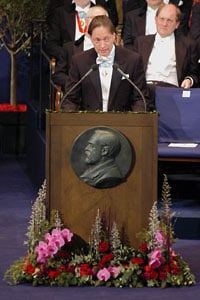Award ceremony speech
English
Presentation Speech by Professor Horace Engdahl of the Swedish Academy, December 10, 2004.
 |
| Horace Engdahl delivering the Presentation Speech for the 2004 Nobel Prize in Literature at the Stockholm Concert Hall. Copyright © Nobel Media AB 2004 Photo: Hans Mehlin |
Your Majesties, Your Royal Highnesses, Ladies and Gentlemen,
What first perplexes when reading Elfriede Jelinek is the strange, mixed voice that speaks from her writing. The author is everywhere and nowhere, never quite standing behind her words, nor ever ceding to her literary figures in order to allow the illusion that they should exist outside her language. There is nothing but a stream of saturated sentences, seemingly welded together under high pressure and leaving no room for moments of relaxation.
Elfriede Jelinek deliberately opens her work to the clichés that flood the news media, advertising and popular culture — the collective subconscious of our time. She manipulates the codes of pulp literature, comics, soap operas, pornography and folkloristic novels (Heimatsroman), so that the inherent madness in these ostensibly harmless consumer phenomena shines through. She mimics the prejudices we would never admit to, and captures, hidden behind common sense, a poisonous mumble of no origin or address: the voice of the masses. She has said that she taps at language to hear its hidden ideologies, much as a doctor will tap on a patient’s chest. Aghast, we discover how class oppression, sexism, chauvinism and the distortion of history echo through everyday conversation. Sport is immediately suspect: its militaristic drills, the uniforms, the cult of the strong and the victorious. Nature: a political trap. Austria’s alpine landscape has been the perfect backdrop for her destruction of the idyllic.
When our normal ideals and daydreams are rendered with Elfriede Jelinek’s instrumentation of heartless word-plays, macabre metaphors and infernally twisted quotations from the classics, they are never again the same. Her insinuating tone, like infrared light elucidates the hidden writing of civilisation. Where we saw normal society, we now see a locked-down system of male/female, assault and submission, hunter and prey. Indeed, we are forced to accept that we find the hunter’s language sexier than the prey’s. Elfriede Jelinek’s social criticism is formed not from the safe distance of superior knowledge but from the depths of an unqualified contamination. In her works, the dead return not to comfort but to bear witness. Ghosts are as ubiquitous as the living, and there is no clear distinction between them. The woman’s being is like the vampire’s, at once alive and dead, since her full expression is forbidden. Some of Elfriede Jelinek’s heroines seem to have stepped out of male fantasies of blood-sucking she-monsters from the turn of the 20th century. As heir to a long line of linguistically critical Austrian writers, from Johann Nepomuk Nestroy to Ingeborg Bachmann and Thomas Bernhard, she also knows the importance of deflating the pathos of disaster. Her parade of luckless princesses from fairytales and real life in the drama suite Der Tod und das Mädchen is condensed into the picture of Marilyn Monroe’s blonde hair billowing out from under the lid when they close the coffin at her funeral. Swiftly comes the deprecating simile: “like foam seeping from a fire extinguisher”.
Literary genres pale to disappearance under Jelinek’s hand. Her plays are not theatre, rather “texts to be spoken”, liberated from the tyranny of dramatical roles. Astonished directors find she has delivered into their hands material to revolutionise theatre.
Her novels — the sweet girls as losers in Women as Lovers, the murderous logic of youth revolt in Wonderful, Wonderful Times, the aesthetic of self-mutilation in The Pianist, the endless repetition of the simple fact of penetration in Lust, the ABC of the violation of women in Gier — cheerfully break the laws of classic narrative art. The author does not cede the floor, observing her characters almost as insects under a glass cover. Her phrasing is itself the action. Through the musical interchange of voices and counter-voices, a world comes into being, illuminated by her life-giving fury.
What is a hero in a literary work? Other differences aside, it is someone who is right when the world is wrong. In male modernism, it has often been the author himself, disguised as the solitary voice of the outcast ego. This invites empathy and identification, thereby producing literature’s eternal karaoke-effect, where the reader joins in on the chorus. The difficulty in reading Elfriede Jelinek is that there is no sympathetic narrator in whom the reader can rest and with whom the reader can identify. It is an awakening from the narcissism of reading.
Her writings perhaps give us a dark picture of life, but she is no pessimist, since in pessimism there is generally a whiff of self-pity and a tacit plea. Rather, grinding through her imprecations is a scandalous joviality without hope, rays from a black sun.
Most honoured Elfriede Jelinek!
In the words of Hegel, woman is society’s irony. Through your writing, you have given new currency to an heretical feminine tradition and have expanded the art of literature. You negotiate with neither society nor your time, nor do you adapt to your readers. If literature by definition is a force that bends to nothing, you are in our day one of its truest representatives.
Nobel Prizes and laureates
Six prizes were awarded for achievements that have conferred the greatest benefit to humankind. The 14 laureates' work and discoveries range from quantum tunnelling to promoting democratic rights.
See them all presented here.
